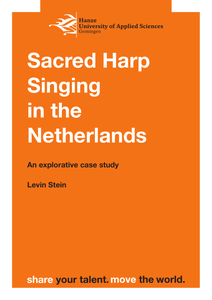This study employed an exploratory approach by applying practice theory to insights gathered throughthe triangulation of interview, document analysis and observation methodologies to 1) map the SacredHarp Singing practice scope and give a nuanced picture of its performativity in the Netherlands, witha particular focus on the Sacred Harp group from Amsterdam comparing it to one from Bremen and 2)investigate the underlying rise of transformative emotions, the social, secular, and religious meanings, andthe sense of belonging to an international community. The findings suggest that Sacred Harp enthusiastsin the region are keen on retaining the legacies of the traditional singers by establishing similar singingatmospheres and by following the practice’s historical customs and practices, including the communalsinging in the “hollow square” and the affinity towards democratic participation. The findings alsoindicate that while there is a noticeable level of commitment and excitement among local enthusiasts,the growth of the groups’ memberships is hampered by a lack of interest by the general public, possiblyin connection with insufficient strategies for publicizing the practice. Therefore, the existence of thesebarriers could imply that the practice would probably grow at a relatively slow pace in the region.
DOCUMENT

Dysarthritic Parkinson speech is characterised by impairment of expressive linguistic prosody, even making it difficult to understand. While rigidity and bradykinesia can be held responsible for a general decline in speaking ability, the origin of prosodic impairment must be seen in the light of the accompanying impairments of receptive prosody such as the inability to recognize intonational meaning and make lexical distinctions based on stress contrasts . The stimulating effect of music on motor coordination in afflicted patients suggests that music might have a similar effect on vocal behavior. It could be hypothesized that the singing of Parkinson patients might remain relatively unaffected by the disease. In this study, vocal improvisation was used to compare the singing of Parkinson patients with that of healthy controls, matched for age and gender. When F0 , range, mean absolute slope, and tempo were contrasted, Parkinson patients did not differ significantly from controls.
DOCUMENT

People with voice problems can seek advice and therapy from a speech-language pathologist. Besides having problems with the speaking voice, a number of them are also amateur choristers. In addition to her standard examination, the speech-language pathologist has to specifically describe the use of the singing voice during choral singing and to assess the amount of mutual influence of speaking and singing voice. In therapy, a healthy phonation is learned. In today's practice, the therapist tends to confine herself to training the sepaking voice. It is known that pitch variation influences phonation. As pitch is a complicating factor in singing, the therapist could make the client aware of this influence by using exercises that alternate speaking and singing voice. Reference to and cooperation with singing teachers is essential. A network of speech-language pathologists 'with an ear for singers' and singing teachers should be built up.
DOCUMENT
When teaching singing clients, it is very important for speech therapists, singing teachers and choir conductors to work in close cooperation. To prevent any misunderstandings, the three professional groups should clarify the dividing-up of job responsibiities. Basic assumption is the healthy voice; every singer should learn to phonate as healthy as possible within his of her own idiom.
DOCUMENT
Author version of opiniating article (Dutch) in national newspaper Trouw, appeared under the title 'Zingen, dat is beter dan muziekonderwijs'. Plea for singing in primary schools.
DOCUMENT

Parkinson’s disease is characterized not only by bradykinesia, rigidity, and tremor, but also by impairments of expressive and receptive linguistic prosody. The facilitating effect of music with a salient beat on patients’ gait suggests that it might have a similar effect on vocal behavior, however it is currently unknown whether singing is affected by the disease. In the present study, fifteen Parkinson patients were compared with fifteen healthy controls during the singing of familiar melodies and improvised melodic continuations. While patients’ speech could reliably be distinguished from that of healthy controls matched for age and gender, purely on the basis of aural perception, no significant differences in singing were observed, either in pitch, pitch range, pitch variability, and tempo, or in scale tone distribution, interval size or interval variability. The apparent dissociation of speech and singing in Parkinson’s disease suggests that music could be used to facilitate expressive linguistic prosody.
LINK
Paper presented at the 43rd ICTM World Conference, 16-22 July 2015, Astana, Kazakhstan. The paper discusses some aspects of the shanty choir phenomenon in the Netherlands and contains a methodological discussion concerning ethnomusicology-at-home, 'neo-classical fieldwork' and the place of participant observation in ethnography.
DOCUMENT
In this interview David Berkman talks about many subjects, among them improvisation, and why classical musicians should improvise more. David Berkman: ‘I would say most Jazz musicians have a certain level of theoretical understanding of what they’re doing, and it’s probably higher than that of the average classical performer, because they are making scales on chords. I wouldn’t say it’s higher in the sense that they know more theory, but they have more practical theory at their disposal, since what they’re focused on is making up the notes, coming up with the theoretical structure.’ David also discusses ear training, the importance of singing, teaching students how to practice and why lessons at schools are utterly unnecessary. David Berkman: ‘The more I teach, the more I think that the classes are almost worthless. I mean that’s my personal belief. More and more, I feel the most important thing is having direct contact with the student while they’re playing and you’re playing and you’re working something out.’
DOCUMENT